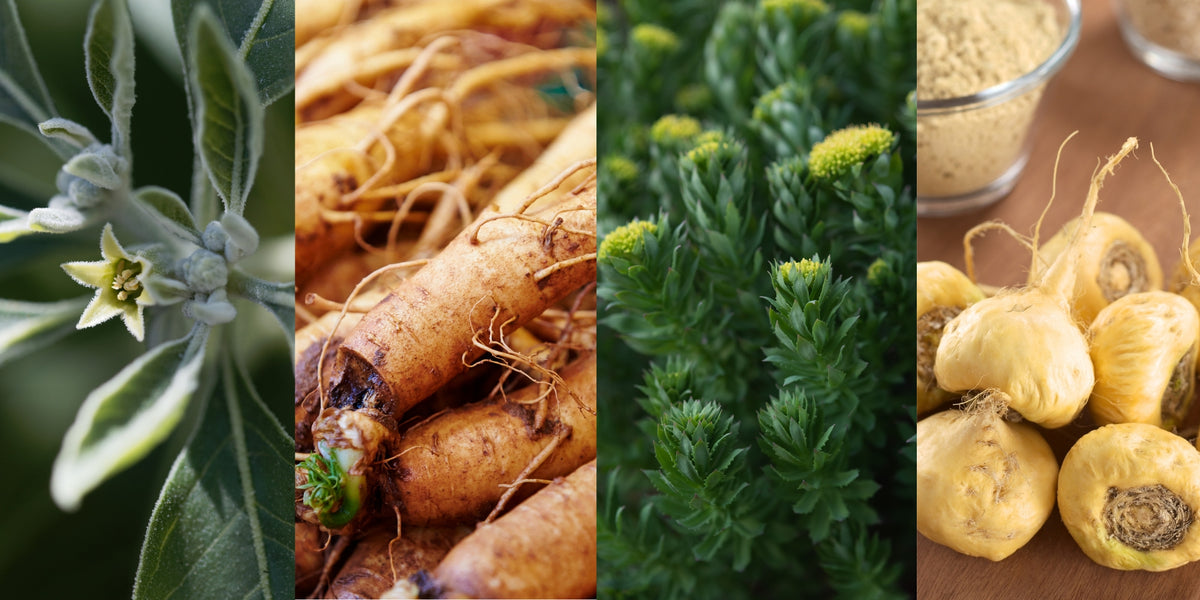4 Calming Adaptogens That Ease Holiday Stress

Article at a Glance:
- Adaptogens can be a helpful stress-relieving tool during the hectic holiday season.
- These plants or mushrooms help your body achieve a state of balance by increasing or decreasing certain chemical.
- reactions depending on what’s needed.
- Ashwagandha, Rhodiola rosea, ginseng, and maca are four adaptogens that have proven stress-relieving properties.
- You may need to take adaptogens for a week or two before you notice benefits, so plan ahead this holiday season.
The holidays are a hectic (and stressful) time of year for most of us. When you add cooking, entertaining, party-hopping, and gift-buying to your already jam-packed schedule, it's easy to burn the balsam fir-scented candle at both ends.
You may be tempted to reach for a plate of Santa-shaped sugar cookies or a glass of eggnog (with extra brandy) to soothe your nerves. But there is another option: adaptogens.
What Are Adaptogens?

Adaptogens are plants (or mushrooms) that help your body achieve homeostasis, a state of physiological balance. They do this by increasing or decreasing certain chemical reactions in your body depending on what’s needed.
If your heart is racing after an intense Zoom call with your boss, for example, an adaptogen could help reduce the amount of the stress hormone cortisol coursing through your veins.
If you’re glued to the couch after a long, exhausting week of work, holiday shopping, and taking care of sick kids, on the other hand, an adaptogen could give you a little bump of cortisol so you feel up to getting outside and enjoying some rejuvenating time outdoors.
In other words, adaptogens are like a thermostat for your stress response. When it gets too cold or too hot in your house, your thermostat helps restore a comfortable temperature. When you take an adaptogen, it acts upon your neuroendocrine system to balance the release of stress hormones and restore a comfortable state of being in your body.
Which Adaptogens Are Best for Stress?
- Ashwagandha
One of the most popular stress-soothing adaptogens is an Ayurvedic herb called ashwagandha. A 2021 research review found that ashwagandha root and leaf extracts positively impacted stress and anxiety. Researchers believe this is because ashwagandha can help modulate the sympathetic–adrenal–medullary (SAM) axis, your body’s stress response system.
- Rhodiola rosea
Rhodiola rosea has been used for centuries in Russia, Scandinavia, and other parts of Europe to ease stress and enhance well-being. Many modern studies support its calming properties, showing that it can improve resistance to physical, chemical, and biological stress. As a result, it’s the primary adaptogen that’s recommended for stress relief by the European Medicine Agency’s Committee on Herbal Medicinal Products.
- Ginseng
Studies on the adaptogen Panax ginseng (also known as Asian ginseng) show that it can regulate the stress hormones your body releases. It does this by impacting the hypothalamic–pituitary–adrenal (HPA) axis, which is the center of your body’s physiological response to stress.
- Maca
Maca’s best known for promoting hormonal balance, which can support stress resilience. Stress and hormones operate in a feedback loop. When you’re stressed for an extended period of time, it can trigger hormonal imbalances. And when your hormones are out of balance, it can make you feel more stressed and anxious. By positively impacting your hormonal well-being, maca sets you up for a healthier response to stress as well.
How to Use Adaptogens for Stress Relief

If you’re thinking about using adaptogens to ease stress this holiday season, there are a few things you should know. First off, most adaptogens don’t provide instant stress relief. They build up in your system over time, so you may not notice any benefits until you’ve taken them for a week or two. It may be a good idea to start taking them earlier in the season rather than later.
Adaptogens are available in a variety of forms (they’re even in a few of the products in our Re-Lyte line). Some people find it easiest to pop a capsule or take a tincture. Others like to add adaptogen powders to smoothies, hot cereals, beverages, or baked goods. Here are some recipes to inspire you if you feel like getting creative with your daily adaptogen routine.
If your need for stress relief extends beyond the holidays, you should also know that your body may eventually develop a tolerance to an adaptogen you take regularly for a longer time. As a result, some people prefer to cycle adaptogens (i.e. after a few months of taking one, they’ll switch to another one).
Adaptogens are one way to relieve holiday stress, but they’re not the only way. Breathwork is a powerful stress-reducing tool that you can use alongside adaptogens or on its own. Check out these three breathing exercises for peace and stress relief.
Sources:
- Adaptogens — The Cleveland Clinic.
- Effects of Withania somnifera (Ashwagandha) on Stress and the Stress-Related Neuropsychiatric Disorders Anxiety, Depression, and Insomnia — Current Neuropharmacology.
- Sympathetic–adrenal–medullary axis (SAM) —APA Dictionary of Psychology.
- Rhodiolae roseae rhizoma et radix — European Medicines Agency.
- Rhodiola — National Center for Complementary and Integrative Health.
- Stress management and the role of Rhodiola rosea: a review — International Journal of Psychiatry in Clinical Practice.
- Rhodiola rosea L.: an herb with anti-stress, anti-aging, and immunostimulating properties for cancer chemoprevention — Current Pharmacology Reports.
- Effects of ginseng on stress-related depression, anxiety, and the hypothalamic–pituitary–adrenal axis — Journal of Ginseng Research.
- Hypothalamic–pituitary–adrenal axis (HPA axis) —APA Dictionary of Psychology.
- Beneficial effects of Lepidium meyenii (Maca) on psychological symptoms and measures of sexual dysfunction in postmenopausal women are not related to estrogen or androgen content —Menopause.
- Therapeutic Effects of Pre-Gelatinized Maca (Lepidium Peruvianum Chacon) used as a Non-Hormonal Alternative to HRT in Perimenopausal Women - Clinical Pilot Study — International Journal of Biomedical Science.
- I Tried an Anti-Stress Cocktail for 30 Days— Here’s What Happened — Healthline.
